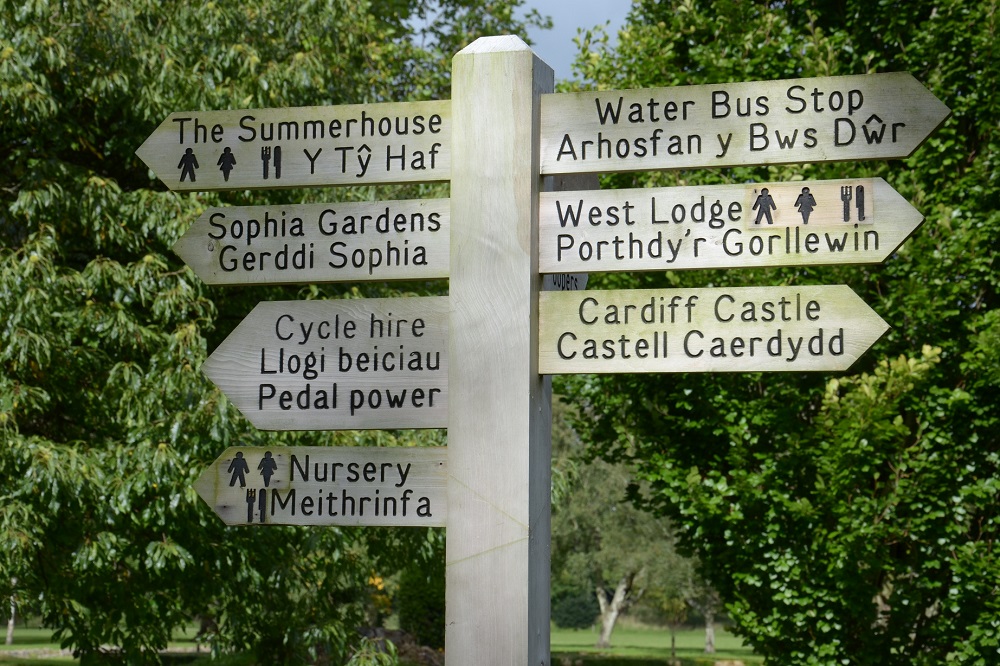We need to prepare for any negative effects of Brexit on the Welsh language

*English version below*
Anna Rolewska, Swyddog Polisi Comisiynydd y Gymraeg
Yn ôl y cyn-Ysgrifennydd Gwladol dros Ymadael â’r UE, David Davis AS, Brexit fydd ‘newid mwyaf ein cenhedlaeth’. Yn wir, mae’n anodd meddwl am faes polisi na fydd yn cael ei effeithio gan Brexit.
Ni wyddom eto pa fath o berthynas fydd rhwng Prydain a’r UE ar ôl Mawrth 2019. Ond beth bynnag ein barn wleidyddol, mae’n deg a phriodol tynnu sylw at risgiau a heriau a allasai godi o ganlyniad i’r broses.
Mae yna rai meysydd sydd wedi derbyn prin iawn o sylw yn y drafodaeth hyd yma; ac yn anffodus, mae’r Gymraeg yn un o’r pynciau hynny. O ganlyniad, dros y misoedd diwethaf rydyn ni wedi bod yn cyfrannu at y drafodaeth drwy amlygu risgiau posibl Brexit i siaradwyr y Gymraeg a chymunedau Cymraeg eu hiaith.
Mae sectorau fel y sector amaeth a’r sector ôl-16 yn eithriadol o bwysig i’r Gymraeg. Mae’r ddwy’n cyflogi canrannau uchel o siaradwyr Cymraeg. Busnesau amaethyddol sy’n cynnal llawer o gymunedau gwledig lle siaredir y Gymraeg fel iaith naturiol pob dydd; y sector ôl-16 sy’n gyfrifol am gynhyrchu gweithlu medrus dwyieithog.
Mae’r ddwy sector yn manteisio’n helaeth ar fuddion aelodaeth o’r UE, gan gynnwys cymorth ariannol, trefniadau masnachu rhydd a threfniadau teithio rhydd. Yn anffodus, golyga hyn eu bod nhw hefyd yn agored i niwed eithriadol yn sgil Brexit. Teg yw ofni bod unrhyw ergyd i’r sectorau hyn yn debygol o fod yn ergyd i’r Gymraeg hefyd.
Yn ogystal, mae cyllid Ewropeaidd wedi cefnogi’r Gymraeg yn fwy uniongyrchol. Llwydodd sefydliadau fel yr Urdd, y Mentrau Iaith a Four Cymru i ddenu cefnogaeth Ewropeaidd tuag at brosiectau hybu sgiliau a busnes, ac roedd y Gymraeg wrth galon eu gweithgareddau.
Mae arian Ewropeaidd wedi hwyluso mentrau a phrosiectau eraill sy’n hysbys i bawb – fel adnewyddu Canolfan Nant Gwrtheyrn a chynhyrchu’r Gwyll / Hinterland. Eto, mae sail i bryderu na fydd cefnogaeth debyg ar gael ar ôl Brexit.
Tanseilio
Nid goblygiadau ariannol yn unig sydd dan sylw, fodd bynnag. Mae’r UE yn blatfform pwysig ar gyfer siaradwyr amryw o ieithoedd llai i weithio ar y cyd a manteisio ar gefnogaeth ddeallusol a gwleidyddol.
Mae’r Undeb yn gartref i rwydweithiau fel NPLD (Network to Promote Linguistic Diversity), a phrosiectau cyfnewid diwylliannol megis Erasmws+. Gall Brexit atal siaradwyr Cymraeg rhag manteisio ar gyfleodd fel hyn yn y dyfodol.
Mae goblygiadau cymdeithasol ehangach posibl hefyd. Awgrymodd y cyfreithiwr Emyr Lewis fod perygl y bydd Brexit yn arwain at ymyleiddio llais cymunedau lleiafrifol yn y trafodaethau gwleidyddol a thanseilio parch tuag atynt. Gwyddom y bu cynnydd trawiadol yn nifer y troseddau casineb ers pleidlais Brexit.
Mae sylw hefyd wedi bod i sylwadau sarhaus sy’n targedu siaradwyr Cymraeg. Rhaid nodi nad oes ymchwil cadarn sy’n cysylltu datganiadau o’r fath â Brexit, fodd bynnag, credwn fod yr hinsawdd gymdeithasol sydd gennym heddiw yn sgil y bleidlais yn creu awyrgylch sy’n ffafriol ar gyfer ffyniant agweddau fel hyn.
Yn olaf, gall Brexit effeithio ar y gyfundrefn diogelu hawliau dynol sylfaenol yn y DU. Mae’r effaith bosibl ar hawliau ieithyddol unigolion yn ymddangos yn gymharol gyfyngedig ar hyn o bryd.
Er hynny, mae’n rhaid i ni fonitro’n ofalus ddatblygiad y drafodaeth am ddyfodol Deddf Hawliau Dynol 1998 a’r cynlluniau i gyflwyno Bil Hawliau Prydeinig yn ei lle.
O’r agweddau uchod, mae Llywodraeth Cymru wedi rhoi rhywfaint o sylw i effaith posibl Brexit ar y Gymraeg yng nghyd-destun y sector amaeth. Yn y papur ymgynghorol ar ddyfodol y cymorthdaliadau i’r sector amaeth a choedwigaeth yng Nghymru – ‘Brexit a’n Tir’ – gwelwn gydnabyddiaeth o bwysigrwydd y Gymraeg i’r gyfer Cymru wledig.
Fodd bynnag, dadleuom ni ac eraill fod rhaid cymryd camau llawer cryfach er mwyn diogelu’r cysylltiad rhwng y Gymraeg a’r sector amaeth, gan gynnwys dynodi’r iaith fel ‘nwydd cyhoeddus’ o dan y polisi newydd.
Y tu hwnt i’r sector amaeth, ni fu llawer o sylw gan Lywodraeth Cymru i oblygiadau Brexit i’r Gymraeg, a phrin yw’r dystiolaeth bod Llywodraeth y DU wedi ymrwymo unrhyw sylw penodol i’r mater.
Ym mis Rhagfyr 2018 ysgrifennom at Weinidog y Gymraeg a Dysgu Gydol Oes, Ysgrifennydd Gwladol Cymru ac Ysgrifennydd Gwladol dros Ymadael â’r UE. Galwom am iddynt roi sylw i’r mater ac i ymgysylltu a’i gilydd i liniaru unrhyw effeithiau negyddol Brexit ar y Gymraeg.
Croesawn yn gynnes hefyd adroddiad diweddar Pwyllgor Diwylliant, y Gymraeg a Chyfathrebu’r Cynulliad sy’n galw ar Lywodraeth Cymru i gynnal asesiad risg ar effaith Brexit a’r iaith Gymraeg a’i siaradwyr.
Roeddem wedi bod yn galw am asesiad o’r fath ers sbel, a byddwn yn cadw llygad barcud ar ymateb y Llywodraeth i’r argymhelliad.

Anna Rolewska, Policy Officer for the Welsh Language Commissioner
According to the former Secretary of State for Leaving the EU, David Davis MP, Brexit will be ‘biggest change for a generation’. Indeed, it is difficult to think of any policy area that will not be affected by Brexit.
We don’t yet know what kind of relationship Britain will have with the EU after March 2019. But whatever our own political views, it is fair and appropriate to highlight the risks and challenges that could arise as a result of the process.
In this respect, some policy areas have received very little attention in the discussions so far. Unfortunately, the Welsh language is one of those areas.
As a result, over the past few months we have been trying to highlight the potential risks of Brexit for Welsh speakers and Welsh-speaking communities.
Sectors such as the agricultural sector and the post-16 sector are extremely important for the Welsh language. Both employ a high percentage of Welsh speakers.
Agricultural businesses are the life blood of many rural communities where Welsh is spoken as the natural everyday language; the post-16 sector is responsible for producing a bilingual skilled workforce.
The two sectors rely extensively on the benefits of the EU membership, including broad financial support, free trading arrangements and free travel arrangements.
Unfortunately, this also means they are vulnerable to exceptional damage due to Brexit. It is fair to fear that any blow to these sectors is likely to be a blow to the Welsh language as well.
European funding has also supported the Welsh language more directly. Organisations such as the Urdd, Mentrau Iaith Cymru and Four Cymru have attracted European support to projects aimed at promoting skills and business, with the Welsh language at the heart of their activities.
European funding has supported other well-known initiatives and projects – such as the renovation of Nant Gwrtheyrn centre and the production of Y Gwyll / Hinterland. Again, there are grounds for concern that similar support will not be available after Brexit.
Marginalise
We should also consider implications other than funding. The EU is an important platform for speakers of various minority languages to work together and take advantage of intellectual and political support.
It is home to networks such as the NPLD (Network to Promote Linguistic Diversity), and cultural exchange projects such as Erasmus+. Brexit could prevent Welsh speakers from benefitting from opportunities such as these in the future.
Wider social implications are also possible. Lawyer Emyr Lewis suggested that Brexit could lead to marginalising the voice of minority communities in political discourse and undermine respect towards them.
We know that there has been a dramatic increase in the number of hate crimes since the Brexit vote. There has also been a spotlight on insults aimed at Welsh speakers.
It must be noted that there is no solid research that connects these statements with Brexit. However, we believe that the social climate that emerged in the wake of the vote has created an atmosphere that allows such attitudes to prosper.
Finally, Brexit could affect the system for protecting basic human rights in the UK. The potential impact on individuals’ language rights appears to be relatively limited at present.
However, we must carefully monitor the development of the discussion about the future of the Human Rights Act 1998 and plans to introduce a British Bill of Rights to take its place.
Of the above considerations, the Welsh Government has given some attention to the potential impact of Brexit on the Welsh language in the context of the agriculture sector.
In the consultation paper on the future of subsidies to the agricultural sector and forestry in Wales – ‘Brexit and our land’ – it acknowledged the importance of the Welsh language for rural Wales.
However, we argued with others that a stronger action is needed in order to protect the connection between the Welsh language and the agricultural sector, including designating the language a ‘public good’ under the new policy.
Beyond the agricultural sector, the Welsh Government has paid little attention to the implications of Brexit for the Welsh language. There is also little evidence that the UK Government has given any specific attention to the issue.
For this reason, in December 2018 we wrote to the Minister for the Welsh Language and Lifelong Learning, the Secretary of State for Wales and the Secretary of State for Leaving the EU.
We called on them to address the issue and to work together to mitigate any negative effects of Brexit on the Welsh language.
We also warmly welcome the recent report by the Assembly’s Culture, Welsh Language and Communications Committee, which calls on the Welsh Government to produce a risk assessment of the effect of Brexit on the Welsh language.
We have been calling for such an assessment for a long time now and we will be keeping a keen eye on the Government’s response to the recommendation.
Support our Nation today
For the price of a cup of coffee a month you can help us create an independent, not-for-profit, national news service for the people of Wales, by the people of Wales.





